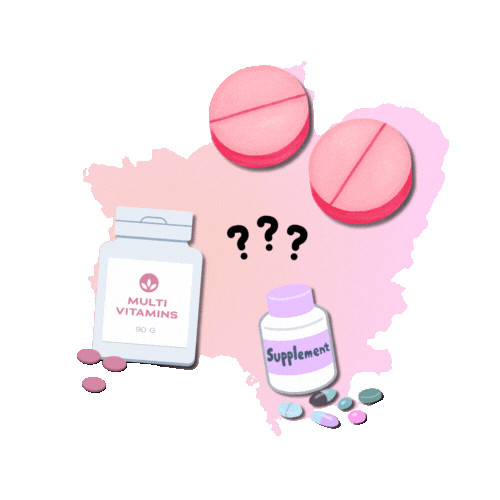the fear mongering around antidepressants
According to the CDC, “About one in 10 Americans aged 12 and over takes antidepressant medication.” With over 300 million Americans making up the population, that means at least 30,000,000 people are on antidepressants nationwide. And yet, more and more holistic practitioners and spiritual gurus are claiming anxiety, ADHD, depression and other mental health conditions can be solved through supplements, meditation and diet. Gut health has been one of the most recent ties to mental health from both western and eastern medicine practitioners, but while traditional doctors recommend a probiotic for a balanced gut biome, eastern practitioners claim that + vitamin deficiencies can be to blame for some mental health issues.
Depression and anxiety symptoms unfortunately overlap with those of autoimmune disease symptoms or IBS, to name a couple. This makes it difficult to understand which comes first — the chicken or the egg — when childhood trauma and persistent stress increase the likelihood of developing chronic health issues, like autoimmune disorders, something many people have been turning to holistic practitioners to help treat. While western doctors are more inclined to treat symptoms, eastern naturopaths are more interested in treating the root cause, a compelling case for frustrated patients.
When you look at the brain of someone with ADHD, depression, anxiety or bipolar, to name a few, it is starkly different to that of someone without a mental health disorder. Typically, the brain’s limbic system — the hippocampus, hypothalamus, thalamus, and amygdala — showcase heightened activity when one of these disorders is present, according to Northwestern Medicine. With bipolar disorder, there is a “thinning of grey matter” (Bayview Recovery). Grey matter helps you process information and stimuli and is essential for mental function & memory. This is how dementia can occur — when grey matter decreases.
With all of these examples of how mental health issues can damage our brains long-term without treatment, it is imperative that brain health is prioritized. Vitamin B complexes help encourage mental health and cognition function, while optimal levels of folate help balance out depression in conjunction to antidepressants, not in lieu of. While dietary intervention plays a key role in brain health and physical health (by helping you avoid nutritional decencies, according to Web Md), it is stated that “vitamin supplements cannot replace mental illness treatment medication.” Furthermore, Dr. Thomas Maclaren adds, “Research on the use of supplements for depression is ongoing. Recent studies have provided mixed results, highlighting the need for further investigation to determine the effectiveness and safety of specific supplements,” he added.
While there are many success stories with natural supplements and diet changes, with many proclaiming it was an autoimmune disease or gut health issue or deficiency that causes their mental health issues, there is still a stigma around taking medication instead — especially with older generations who also refuse to go to therapy and confront deep-seeded emotional traumas, which are directly linked to the development of mental illnesses.
It is also so disappointing to see the fear-mongering on Drugs.com and Reddit for anti-depressants. This specifically hurts those with OCD and/or anxiety, who obsessively look up drugs in fear of them causing terrible side effects. When random strangers post about something sending them to the hospital or causing some sort of physical issue (which could be from something else completely unrelated), it can cause the placebo effect in readers or extreme fear about something that could interact with their body differently and change their life for the better. I’m not usually harsh in my opinions (I try to be open-minded and neutral), but it truly makes me so mad — it’s so selfish and careless to put that sort of thing out there that raises public alarm in those who are actively trying to get better and perhaps are afraid or reluctant to get help. Everyone has a different experience, and what’s awful is most people who have a bad experience with these drugs are angry and disappointed (and more likely to share their experience than someone positively affected by a drug and living their best life), which is understandable, but they don’t have to scare others whose bodies and minds are completely different. There are respectful, thoughtful ways to share your experience that don’t scare people who are already on high alert about how medication could harm them. I’ve seen some reviews that end with “But that’s just my experience! Everyone’s bodies work differently”, which is a much more thoughtful, caring, less impulsive way to look out for those suffering.
While antidepressants have a much higher success rate than the still-developing, limited studies on supplements and their efficacy on mental illness, there is still much more inclination to take the natural route, even at the risk of your anxiety or depression spiraling out of control. Interestingly, one of the biggest causes of medical issues is stress, which wreaks havoc on your body. Despite being diligent with vitamins, diet and exercise, if you don’t have your stress under control (which shows up in bouts of anxiety, depression, bipolar episodes, etc.), the benefits of those rituals can be outweighed. This is why there is such a debate on the natural route vs. antidepressants, because living in today’s world can be overwhelming, and sometimes even the strongest of brains cannot handle the constant pressure to maintain a balanced life all while making adequate money to pay their bills. So, which should be addressed first? Either way, antidepressants, an illusive concept to many, need to be explained better in how they directly target receptors to help pave new neural pathways in conjunction with therapy. While naturopathic markets do an excellent job of explaining the benefits of their products, the classic orange bottle littered with brow-raising side effects does not do a good job of presenting as a positive force of good in people’s lives, despite having so many success stories.
Do you have negative feelings around antidepressants, or do you feel like they get a bad rap?



